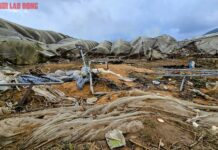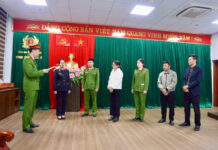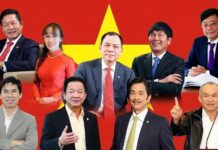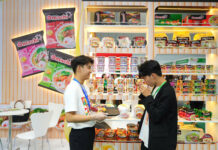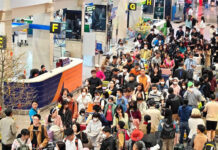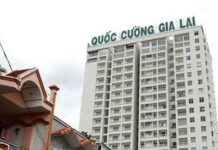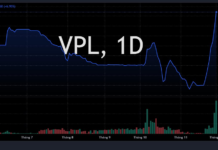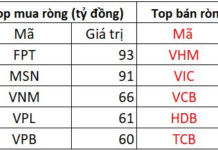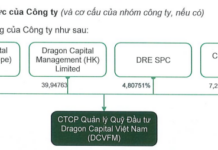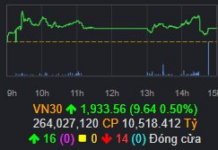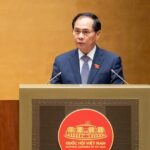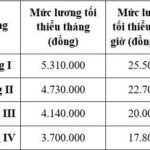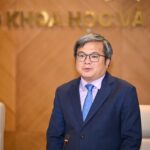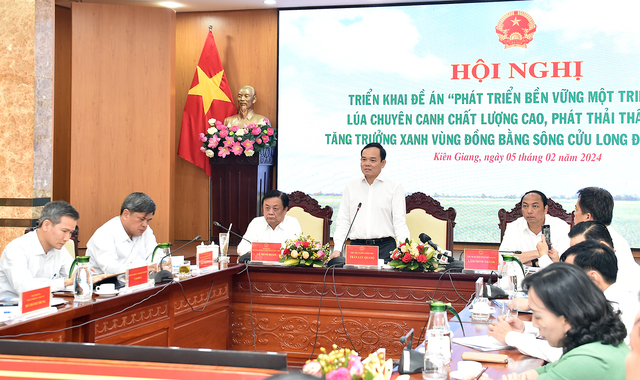
Deputy Prime Minister Tran Luu Quang presides over the conference on implementing the project “sustainable development of 1 million hectares of high-quality, low-emission rice in the Mekong Delta region by 2030” – Photo: VGP/Hai Minh
The conference was attended by Minister of Agriculture and Rural Development Le Minh Hoan, leaders of central ministries and agencies and 12 Mekong Delta localities, scientists, representatives of international organizations.
The Mekong Delta, with a natural area of 4,092,000 hectares, including 2,575,000 hectares of agricultural land, is one of the major rice production areas in Vietnam. Rice production in the region has been stable in recent years, with a volume of 24-25 million tons, accounting for over 55% of the country’s rice production and over 90% of its rice exports, creating jobs and income for millions of agricultural households in the region.
Rice exports in 2023 reached over 4.8 billion USD, an increase of 17.4% in volume and 39.4% in value compared to 2022. The export price of Vietnamese rice is continuing to increase and gradually reaching the highest group in the world.
Despite the achievements, the Mekong Delta still faces limitations such as a lack of concentrated rice cultivation areas, large-scale, linked value chain, between rice growers and cooperatives, businesses; unsustainable rice cultivation due to excessive use of chemical fertilizers, pesticides that affect the environment, increase greenhouse gas emissions, and others.
With a large quantity of rice, the Mekong Delta produces about 26-27 million tons of straw, of which 70% is burned and buried in the ground, and the remaining 30% is collected and used for mushroom cultivation, crop cover, transportation cushion or animal feed. Burning straw causes environmental pollution while burying it in waterlogged fields increases the emission of methane (CH4) and other greenhouse gases. This situation requires straw management in a way that maximizes the nutrition contained in straw, reduces nutrient loss, environmental pollution, greenhouse gas emissions, while increasing income for rice growers and related services.
Meanwhile, market requirements are increasing, regulations of importing countries are becoming stricter, demanding that the quality of rice must be improved, ensuring food safety, including reducing the use of chemical inputs, reducing production emissions. In addition, at COP26, the Prime Minister also committed to strive to achieve net zero emissions by 2050.
In this context, the Government has approved the project “Sustainable Development of 1 million hectares of high-quality and low-emission rice and green growth in the Mekong Delta region by 2030”.
The project is of special importance in the direction of transforming sustainable rice cultivation methods in the Mekong Delta, and establishing and developing large-scale and stable raw material areas, ensuring sustainable and efficient cultivation practices.
The project aims to reduce 30% of input costs, reduce rice production costs for farmers by about VND 9,500 billion ($415 million); increase rice growers’ profit rates by 50%; and contribute to reducing 10% of greenhouse gas emissions.
The project is associated with the reorganization of the production system according to the value chain, applying sustainable cultivation processes to increase the value and sustainable development of the rice industry, improve business production efficiency, farmers’ income and livelihoods, protect the environment, adapt to climate change, reduce greenhouse gas emissions, and contribute to the implementation of Vietnam’s commitments with the international community.
During the project’s implementation, new policies will be introduced, in line with global trends, as pilot programs such as paying carbon credits based on the results for 1 million hectares of high-quality rice and low emissions, promoting circular production, and exploiting the multiple values in rice production with investment or credit mechanisms aimed at attracting businesses in the production and processing of rice.
From the successful pilot, this model in the Mekong Delta will be expanded nationwide, aiming to make “Green Development, Low Emissions, High Quality” the brand of Vietnamese rice.
The Ministry of Agriculture and Rural Development estimates the total capital source for implementing the project at about $800 million from sources: the budget; credit, socialization of capital; non-refundable grants, official development assistance loans and other legal sources, of which the main source is from non-refundable aid, loans, credit, and carbon credit revenue.
Deputy Minister of Agriculture and Rural Development Tran Thanh Nam said the World Bank (WB) has agreed to choose the project as one of the focal projects in the Asia-Pacific region and will provide Vietnam with a loan of $500 million.
Deputy Minister Tran Thanh Nam said the Ministry of Agriculture and Rural Development has established a Steering Committee to implement the project, chaired by Minister Le Minh Hoan, with the participation of leaders of the Ministry of Planning and Investment, Finance, Natural Resources and Environment, State Bank, WB representatives, representatives of 12 Mekong Delta provinces.
The Ministry has also worked with the WB to build and mobilize non-refundable funds and prepare loan projects; it is coordinating with experts from the Carbon Asset Transformation Fund to build an MRV system for the project to serve as the basis for issuing carbon credits for rice production and exchange on the market to increase income for rice growers and related production services.
The Ministry is also working with the State Bank, commercial banks, and the Agriculture and Rural Development Bank to develop a credit program to support businesses, cooperatives participating in the project.
The Ministry will establish a project coordination office located at the Ministry’s headquarters and Can Tho City, Minister Le Minh Hoan said.
According to the Ministry of Agriculture and Rural Development, based on the criteria for concentrated rice cultivation areas, Mekong Delta provinces will identify the areas that meet the criteria, register, and develop plans to implement the project for 2024 and each phase; consolidate and complete the arrangement of funds, infrastructure conditions to implement the project in 2024 and subsequent years.
Localities will strengthen infrastructure systems for rice-bearing areas participating in the project, especially irrigation infrastructure; issue mechanisms and policies to attract investment from businesses; support and develop cooperatives, train cooperative management personnel, upgrade infrastructure to participate in the sustainable rice production value chain.
The localities will also develop specific plans to implement the project, report to the Ministry of Agriculture and Rural Development, and organize project review to report results in 2025.
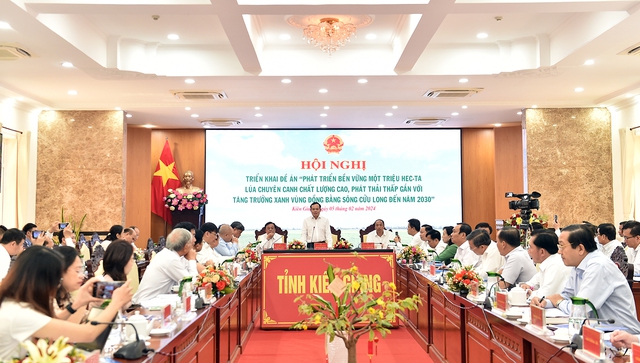
Photo: VGP/Hai Minh
Building a symbiotic ecosystem to implement the project
In their presentations at the conference, representatives of associations, research institutes, and localities all evaluated the project as a “new wind,” reflecting the new determination of the Government to gradually modernize the country’s rice production sector.
The project not only brings direct benefits to nearly 1.5 million farmers but also contributes to affirming Vietnam’s responsibility in ensuring global food security and reducing greenhouse gas emissions.
Many orientations and solutions were suggested to effectively implement the project, and delegates emphasized the need for training farmers to understand and master the technical support packages; introduce scientific and technological advances, rice varieties with outstanding nutritional characteristics; have a recognized monitoring and reporting system to verify that project products are truly “high-quality, low-carbon” rice.
Delegates emphasized the need to clearly define the benefits for businesses participating in the project; invest strongly in mechanization and irrigation infrastructure systems to preserve freshwater for rice production; have a mechanism to coordinate rice export activities to maximize the rights and interests of farmers and Vietnam’s rice export industry; increase information and communication activities to raise awareness about the project.
Delegates also emphasized the need to establish a national-level research program on rice technology to prepare for the next 5-10 years; trial implement carbon credit programs in the context that international organizations are committed to supporting Vietnam in terms of finance and market access.
Delegates highlighted the need to integrate the project with other programs; mobilize resources for the project through public-private partnerships; strengthen international cooperation.
In his closing remarks, Deputy Prime Minister Tran Luu Quang emphasized that Vietnam’s international image and position has continued to be enhanced in recent times, including the contribution of the rice sector in ensuring national food security and global food security when some countries suspend rice exports.
In foreign relations, countries and international organizations highly appreciate Vietnam’s achievements in agricultural development and hope that Vietnam will share experiences and support many developing countries in agriculture and food security.
Deputy Prime Minister Tran Luu Quang highly appreciated the passionate speeches at the conference and emphasized that the project is a big game, so there are 4 difficulties: difficult because for the first time, set a target of 1 million hectares of high-quality rice, low emissions; difficult because of changing habits in dealing with it; difficult because always immediately impacted by volatile changes in rice prices in the market; difficult to reach an agreement on some issues related to the interests of certain organizations, individuals, typically in agreeing on rice export prices.
To achieve the set goals, Deputy Prime Minister emphasized the 10-letter principle: Wholehearted, Compliant, Flexible, Cooperative, Controlled.
He emphasized the need for the Government, localities, and businesses to join hands to gradually improve every farmer’s attitude towards the project. Experience shows that if something is difficult, if there is a correct approach, the right method, and determination, it can be done, typical are achievements in the COVID-19 prevention in which Vietnam ranks 9th in the world.
According to Deputy Prime Minister, if we do not “comply” with the plan, principles, standards, we will fail, but at the same time, we must be “flexible,” creative in behavior, suitable for each region, each locality, and especially adapt to the increasingly serious and unpredictable impacts of climate change.
Deputy Prime Minister emphasized the need to “cooperate” well, firstly in negotiating loans, coordinating among central agencies, between the central and local levels, between businesses; emphasizing that “we will fail if businesses participate in this project individually, not like anyone else, not complying and coordinating”. In addition, it is necessary to integrate programs well to create new integrated strength that can win together.
Deputy Prime Minister also emphasized the need for good “control” to meet standards, not deviate from standards, not deviate course, and timely adjust to suit the actual situation based on regular reviews, general evaluations, especially of models, or good practices.
He affirmed that the Government will commit and accompany in the process of implementing the project, Deputy Prime Minister assigned the Ministry of Agriculture and Rural Development to soon submit to the Government, the Prime Minister: WB loan project to implement the project; Pilot policies, mechanisms for paying carbon credits based on the results for 1 million hectares of high-quality rice and low emissions; and propose additional public investment capital for the Ministry to support investment items in the project.
Deputy Prime Minister assigned the Ministry of Finance to calculate the plan to mobilize funds for implementation of the project; propose integration mechanisms for the project with other programs, possibly similar to the trial mechanism where each locality is allowed to pool capital from all 3 national target programs.
Regarding ODA funding, Deputy Prime Minister emphasized that great attention must be paid to the negotiation process to harmonize procedures between Vietnam and donors, creating favorable conditions for disbursement after receiving loans.

